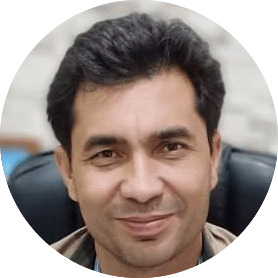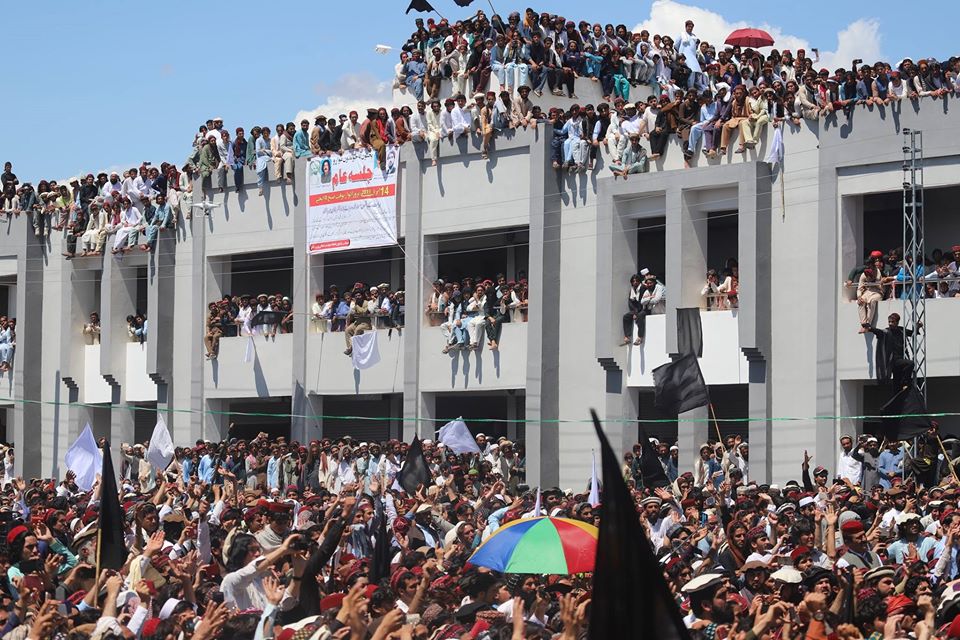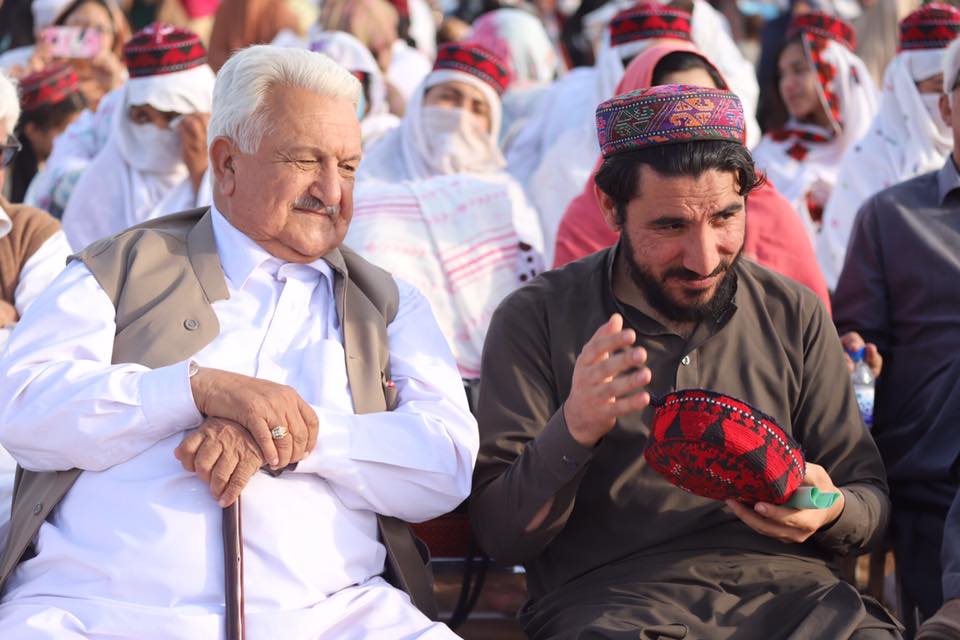A Pashtun Rights Movement Rises; Pakistan Tries to Strangle It

By Manzoor Ali
Staff Writer
11/2/2020

PTM protest in Miramshah, North Waziristan District, 2019
In the early hours of 27th January, a police contingent swooped down on a non-descript residence in the Tehkal neighborhood of Peshawar in northwestern Pakistan. Officers kicked opened doors and hauled several people into vehicles.
At daybreak, news got out that Manzoor Pashteen, a civil rights activist and chief of the Pashtun Tahafauz Movement (PTM) (a human rights movement) was among those detained in the pre-dawn police raid. Pashteen’s arrest led to social media outrage and protests in several cities, and was followed by further arrests of pro-PTM activists in other cities, including Islamabad.
Pashteen’s arrest is the latest in a broad government crackdown against the PTM, which has been going on for several months.
Pashteen’s arrest is the latest in a broad government crackdown against the PTM.
Pashteen hails from the South Waziristan District, a war-torn area that was the birthplace of the Pakistani Taliban and the epicenter of the Taliban insurgency in northwestern Pakistan. Pashteen belongs to the Mahsud tribe, from whose ranks came the main leadership of the Pakistani Taliban in its formative years.

Pashteen (in red cap) at a protest in Peshawar, 2019
In October 2009, the Pakistani military launched operation Rah-e-Nejat (Path of Deliverance) in the South Waziristan District to fight the Taliban. In 2016, after getting a veterinary degree from Gomal University, Pashteen, together with several other young people, founded the Mahsud Tahafuz Movement to defend the rights of tribespeople and call for the removal of landmines the militants and military left in the South Waziristan District after the fighting.
Events would catapult him to national prominence. In January 2018, police killed a Mahsud tribesman, Naqeebullah in Karachi, in what many alleged was a “fake encounter.” “Fake encounters” refer to extrajudicial killings of suspected gangsters or terrorists by police under the pretence of self-defense. News of Naqeebullah’s killing circulated through social media, prompting widespread anger.

Naqeebullah
Pashteen and other members of the Mahsud Tahafuz Movement organized a march towards Islamabad to protest the killing and to draw attention to the tribal region’s plight. When it reached the capital, in Pakistani tradition, the protest turned into a sit-in that lasted 10 days until the government gave written assurances that the protestors’ demands, including the arrest of the officer who killed Naqeebullah, the removal of landmines, the release of people in enforced disappearance cases from custody, and the formation of a truth and reconciliation commission to look into cases of extra-judicial killings and other human rights violations against Pashtuns, would be addressed within a month.
The protest made Pashteen a household name in Pakistan. As its popularity expanded beyond the Mahsud tribe to include other Pashtuns (an Iranian ethnic group), his movement rebranded itself as the Pashtun Tahafauz Movement (PTM), and claimed to fight for the rights of all Pashtuns. Young people were especially attracted to the PTM, and it adopted a Pashto song, “Da Sanga Azadi Da” as its anthem:
“Our youth is being killed, what kind of freedom is this?
Our houses are being destroyed, what kind of freedom is this?
Pashtuns are being ruined, what kind of freedom is this?”
The government’s promises to address the protestors’ issues only eased tensions for a while. Their truce soon fell apart amidst disagreements over terms (for example, they couldn’t agree on the number of people who were supposed to have been forcibly disappeared and detained). PTM protests spread across the country in the coming months, its message buoyed online by the educated, tech-savvy young people who joined its ranks. In May 2018, two senior PTM leaders, Mohsin Dawar and Ali Waziri, ran in the 2018 general elections and were elected to Pakistan’s National Assembly as independents.
On 16th April, 2019, Pashteen appeared before a special committee of the Pakistani Senate, the upper house of its parliament, and presented the PTM’s demands (largely the same demands it made at the 2018 Islamabad sit-in). A spokesman from the Pakistani army responded that, whilst the army wanted to make every effort to resolve the Pashtun issues in the tribal belt, the manner in which the PTM was voicing such grievances (apparently a reference to its criticism of the armed forces) would not be tolerated. He also accused the PTM of receiving funding from foreign forces, including the National Directorate of Security (NDS) (the Afghan intelligence agency) and the Research and Analysis Wing (its Indian counterpart).
“[T]ell us how much money did you get from the NDS to run your campaign?” he asked. “How much money did RAW give you for the first dharna (sit-in) in Islamabad?”
On 26th May, 2019, Dawar and Wazir along with a band of about 300 protesters were marching towards a village in North Waziristan District to protest a military search operation in the area following two militant attacks on military personnel, when 13 protesters were killed and several others injured in what the government claimed was an “attack on check post instigated by Mr Dawar and Mr Wazir.”
13 protesters were killed and several others injured in what the government claimed was an attack on a check post.
The PTM denied attacking the check-post and video footage of the protest appearing to lend credence to its story has also surfaced on social media. Wazir and Dawar were arrested following the “clash” and spent several months behind bars and the PTM faced a complete blackout in Pakistani media.
Since then, the government has cracked-down on the PTM, detaining several of its activists. Gulalai Ismail, an award-winning social worker and PTM supporter, who spoke out against sexual assault and enforced disappearance by the Pakistani military, faced arrest and, in September 2019, managed to escape from Pakistan and reach the US, where she claimed asylum.

Ismail (middle) at the Women of the World Festival in London in 2017, where she won the Anna Politkovskaya Award
After his arrest, Pashteen was presented before a court in Peshawar and charged with sedition for a speech he made. He remains in prison to this day.
Since the emergence of the PTM, much has changed in northwestern Pakistan yet much remains the same. The war-torn tribal belt has been merged into the Khyber Pakhtunkhwa province, and its provincial assembly even has a PTM activist as one of its lawmakers. On the other hand, growing censorship of dissenting voices and of the media has risen considerably. Against this backdrop, Pashteen has emerged as a voice of reason for many, calling for democracy and adherence to the Constitution, yet there is also a large number of people who call him a traitor for badmouthing the security forces. The PTM, apparently unfazed by the crackdown, is holding protest rallies across the northwest. That even a largely peaceful movement like the PTM has been so demonized and persecuted by Pakistan’s government and military establishment bodes ill for the future of democracy in the country.
Related posts:
